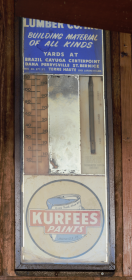Reflection – Fiasco

Suburban Zebra by flickr user MariAn[the Fog]
It is incredible that with merely dices, tables and index cards, players are able to orchestrate a story and tie all bits of seemingly irrelevant information together in a coherent chain. Before playing Fiasco, I was nervous about the fact that I have to improvise in the game, worrying that I might make up a boring story. Yet through the game, I discovered the wealth of my creative mind by piecing together scenes established by other players and identifying the logic inside it. Together we formed a comprehensive, consistent and attractive fiction with an unexpected ending.
My character, Julliet Grande, shared a criminal relationship with Crazy Carl, the character of the player sitting on my right, who made drug deals. While Crazy Carl was in urgent need to earn money from his deals, Julliet, an already respected drug lord, in fact wanted to earn appreciation from her boss (the character of the player on the left) of a medical institution where she worked as a client as her main job. The story took a twisted turn and became snaky when my object was “information”, and my boss with another player Jamie Jones, a divorced man who tried to obtain weeds, shared a mutual secret of mutilating and murdering. By joining the two facts together, I actively spoke up in the game and gave birth to the climax when I claimed I knew their secret, using it as a bargaining chip to publish my under-appreciated medical research paper, while leaking the secret to Jamie’s resentful ex-wife. This insidious act connected me with Jamie’s ex-wife, who was Carl’s sibling and thus also became involved in drug deals. Together we three formed an alliance against my boss and Jamie. The end act occurred in a shopping mall where Carl lured Jamie out on the pretense of selling drugs and intended to kill him in revenge for his divorced sibling. Yet my boss who went to meet Jamie was mistakenly shot and died immediately; at the same time the police, whom I called to investigate the secret murder, arrived and arrested both men.
It is noted that through this game-play experience, we subconsciously applied multiple principles for writing fictions. Fiasco is more like composing a story than simply having fun. The game itself resembles a brainstorming process, where we bring together pieces of information and create a whole picture, filling gaps by improvisation and imagination. For example, a need for conflict was never implied in the relationship between me and my boss, yet in order to mediate my two identities as a drug dealer as well as a normal client, I created this conflict to ensure that everything made sense. There is also an irony of situation when most people didn’t get what they longed for due to the natural development of the game. Such irony brought about an unforeseen yet understandable ending which is commonly considered as a trait of fiction.
Still, playing Fiasco is not completely identical to my traditional approach to writing a story. The game proposes a new way of writing which really helps me with rhetorical composition. The difference between this gameplay and the other work I’ve done is that “I didn’t do those with prior planning or purpose”. While I usually have an idea of what is going on when writing an essay, the skills and strategies employed in Fiasco, such as creating the conflict and devising the vicious scheme, just came along spontaneously. There was no intention, no careful planning. The fact that we composed an appealing and structured plot despite the lack of outlining in advance shed a new light on my future writing method. As opposed to careful planning before writing, as I usually do, I learned that I could just set up a background and develop some clues, through which my thoughts are provoked and my story grows by itself.
Also, through Fiasco, collaboration of group members is invoked as we joined together to brainstorm and inspired each other during the process. A single step of one player can affect that of another. Therefore such domino effect requires us to align our thought processes in order to complete the plot.
It is wonderful to see the process of scattered information converging into a fluid and rich river. Overall, I believe that I really did improve my writing through this thought-provoking gaming experience.



